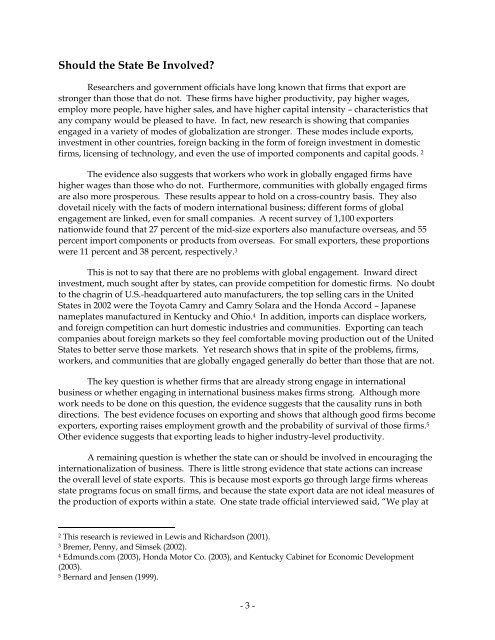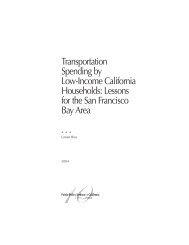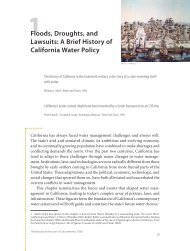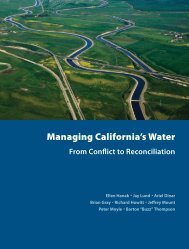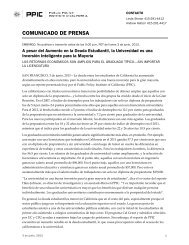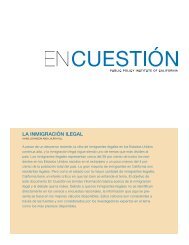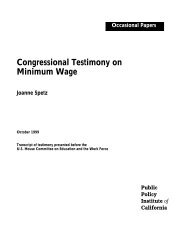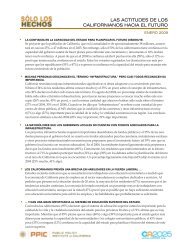Occasional Paper Title - Public Policy Institute of California
Occasional Paper Title - Public Policy Institute of California
Occasional Paper Title - Public Policy Institute of California
You also want an ePaper? Increase the reach of your titles
YUMPU automatically turns print PDFs into web optimized ePapers that Google loves.
Should the State Be Involved?<br />
Researchers and government <strong>of</strong>ficials have long known that firms that export are<br />
stronger than those that do not. These firms have higher productivity, pay higher wages,<br />
employ more people, have higher sales, and have higher capital intensity – characteristics that<br />
any company would be pleased to have. In fact, new research is showing that companies<br />
engaged in a variety <strong>of</strong> modes <strong>of</strong> globalization are stronger. These modes include exports,<br />
investment in other countries, foreign backing in the form <strong>of</strong> foreign investment in domestic<br />
firms, licensing <strong>of</strong> technology, and even the use <strong>of</strong> imported components and capital goods. 2<br />
The evidence also suggests that workers who work in globally engaged firms have<br />
higher wages than those who do not. Furthermore, communities with globally engaged firms<br />
are also more prosperous. These results appear to hold on a cross-country basis. They also<br />
dovetail nicely with the facts <strong>of</strong> modern international business; different forms <strong>of</strong> global<br />
engagement are linked, even for small companies. A recent survey <strong>of</strong> 1,100 exporters<br />
nationwide found that 27 percent <strong>of</strong> the mid-size exporters also manufacture overseas, and 55<br />
percent import components or products from overseas. For small exporters, these proportions<br />
were 11 percent and 38 percent, respectively. 3<br />
This is not to say that there are no problems with global engagement. Inward direct<br />
investment, much sought after by states, can provide competition for domestic firms. No doubt<br />
to the chagrin <strong>of</strong> U.S.-headquartered auto manufacturers, the top selling cars in the United<br />
States in 2002 were the Toyota Camry and Camry Solara and the Honda Accord – Japanese<br />
nameplates manufactured in Kentucky and Ohio. 4 In addition, imports can displace workers,<br />
and foreign competition can hurt domestic industries and communities. Exporting can teach<br />
companies about foreign markets so they feel comfortable moving production out <strong>of</strong> the United<br />
States to better serve those markets. Yet research shows that in spite <strong>of</strong> the problems, firms,<br />
workers, and communities that are globally engaged generally do better than those that are not.<br />
The key question is whether firms that are already strong engage in international<br />
business or whether engaging in international business makes firms strong. Although more<br />
work needs to be done on this question, the evidence suggests that the causality runs in both<br />
directions. The best evidence focuses on exporting and shows that although good firms become<br />
exporters, exporting raises employment growth and the probability <strong>of</strong> survival <strong>of</strong> those firms. 5<br />
Other evidence suggests that exporting leads to higher industry-level productivity.<br />
A remaining question is whether the state can or should be involved in encouraging the<br />
internationalization <strong>of</strong> business. There is little strong evidence that state actions can increase<br />
the overall level <strong>of</strong> state exports. This is because most exports go through large firms whereas<br />
state programs focus on small firms, and because the state export data are not ideal measures <strong>of</strong><br />
the production <strong>of</strong> exports within a state. One state trade <strong>of</strong>ficial interviewed said, “We play at<br />
2 This research is reviewed in Lewis and Richardson (2001).<br />
3 Bremer, Penny, and Simsek (2002).<br />
4 Edmunds.com (2003), Honda Motor Co. (2003), and Kentucky Cabinet for Economic Development<br />
(2003).<br />
5 Bernard and Jensen (1999).<br />
- 3 -


